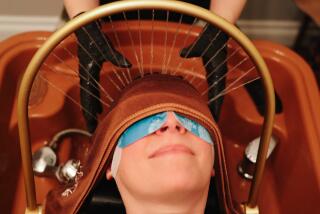Looking to the East for Cures to Western Pain : Initially skeptical of Oriental medicine, Timothy Timmons now touts the virtues of the discipline as a dean at Samra University.
- Share via
Practitioners in Oriental medicine are not only trained in acupuncture but also in nutrition counseling, herbal medicine, exercise therapy and massage.
We can’t perform surgery in the United States, but Oriental medicine is especially well suited for patients with chronic degenerative conditions and pain. If the patient has acute symptoms, such as an infection or a high fever, that clearly warrant Western medical and antibiotic therapies, then we refer the patient to tests right away.
Most patients, though, are coming into our clinic with Western diagnoses already in hand and are seeking additional care in conjunction with their Western physicians.
Although our clinic treats Asian patients, we see people from all ethnic backgrounds. We see people with conditions ranging from neck and back pain, sports injuries, gynecological and digestive complaints to stroke rehabilitation, cancer, depression and chemical dependency.
Recently, we’ve been seeing an increasing number of patients with HIV. Samra is setting up a pilot study in using Oriental medicine to increase blood cell counts in HIV patients.
One of the reasons why more people with chronic degenerative conditions are turning to our profession is that acupuncture stimulates the body to function more efficiently so that it can heal itself.
At Samra, we are trying to establish a field of integrative medicine whereby we train students to work with Western physicians to combine the best of both medical treatments.
This notion of complementary medicine also hits on a personal note. My wife, Christine, who is Chinese, is studying Western medicine at the College of Osteopathic Medicine of the Pacific in Pomona. We both realize the two systems of medicine have something to offer each other.
Our profession is licensed as a primary health care service by the state, and patients do not need a physician’s referral.
Some Western doctors view Oriental medicine with skepticism when they first encounter it because there has been insufficient research underlying acupuncture in this country. To those physicians, I would recommend open-minded skepticism.
That’s the way I approached it at first.
I was a premed student at UC Berkeley in 1977 when my grandfather, who was suffering from tuberculosis, fell and broke his hip. Following his surgery, he responded poorly to the conventional physical therapies and medications designed to alleviate his postoperative pain.
Left with few options, my family began to research alternative therapies. No one in my family had any experience with Oriental medicine, but we decided to give it a try because we had nothing to lose.
Acupuncture helped alleviate his hip pain tremendously, and herbs helped him control his night sweats and coughing blood from his tuberculosis.
Intrigued by the results, I decided to enroll at the American College of Traditional Chinese Medicine in San Francisco in 1980 after finishing my premed studies. At first, it was more of a curiosity, but I’ve been studying it ever since.
Although Chinese medicine is thought to have its roots around 200 B.C., the movement to translate books into English is only a recent undertaking. There is a wealth of information to go after, and Western culture has really only seen the tip of the iceberg.
When I first started to study Oriental medicine, there were very few practitioners. Now, there are more than 3,000 medical doctors and osteopaths who use acupuncture in the United States.
I spent two years in China, Taiwan and Malaysia working in different clinics and research hospitals. I can read and understand Chinese, but I do not speak well enough to teach classes. Since the 1970s, there has been a steady stream of Western doctors going to Asia to learn about Oriental medicine.
This is an exciting time for me and my profession. Many principles of Oriental medicine coincide with the most significant developments in health care today.






